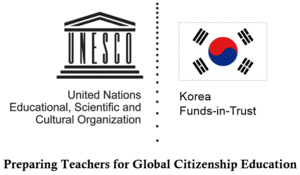
GCED Basic Search Form
Quick Search
You are here
News

Background The Global Education First Initiative (GEFI) launched in September 2012 by United Nations Secretary-General Mr. Ban Ki-moon prioritised the importance of putting every child in school, improving the quality of education and fostering global citizenship. UNESCO has taken up the challenge to promote global citizenship through education in view of current trends, events and turmoil in an increasingly globalized and interconnected world. An education that can inculcate respect for human rights, gender equality, social justice and diversity is critical for developing citizens who possess desirable values, knowledge and skills to ensure inclusive, peaceful and sustainable societies. Several events were held to examine major issues and to formulate strategies and action plans for global citizenship education (GCED), e.g., the Consultation on Global Citizenship Education meeting in Seoul in September 2013; the International UNESCO Forum on Global Citizenship Education in Bangkok in December 2013; the Asia-Pacific High-level Meeting on Global Citizenship Education in the Republic of Korea in July 2014 and the 2nd UNESCO Forum on Global Citizenship Education in Paris in January 2015. In collaboration with UNESCO, the Asia-Pacific Centre for Education for International Understanding (APCEIU) also conducted a Sub-regional Workshop on Teacher Preparation for Global Citizenship Education in Bangkok in December 2013 and in Myanmar in June 2014. The recent World Education Forum in Incheon, Republic of Korea, in May 2015 reaffirmed that education is essential for peace, tolerance, human fulfilment and sustainable development. GCED has emerged as a significant agenda for the construction of post-2015 development goals because of its potential as a transformative education that (i) encourages learners to analyse real-life issues critically and to identify possible solutions creatively and innovatively; (ii) supports learners to revisit assumptions, world views and power relations in mainstream discourses and consider people/groups systematically underrepresented/marginalised; (iii) respects differences and diversity; (iv) focuses on engagement to bring about desired changes; and (v) involves multiple stakeholders, including those outside the learning environment in the community and in the larger circle of the society. The GEFI has identified five barriers to global citizenship: (i) legacy of the current education system; (ii) outmoded curricula and learning materials; (iii) lack of teacher capacity; (iv) inadequate focus on values; and (v) lack of leadership on global citizenship. With support from the Korean Funds-in-Trust, UNESCO Bangkok is implementing a project on Preparing Teachers for Global Citizenship Education to address some of these barriers, particularly in enhancing the capacity of teachers to transmit appropriate and relevant knowledge and skills about global citizenship, updating outmoded curricula and learning materials, and increasing school leadership to support GCED. The overall goal of the project is to empower learners to assume active roles in addressing and resolving local and global challenges through GCED. More specifically, the objectives are to: Increase knowledge of GCED among teacher educators, teachers and school leaders. Enhance capacity of teacher educators and teachers to deliver GCED contents. Strengthen school leaders’ capacity in supporting and implementing GCED in their institutions. Nine pilot countries have been selected as shown below: South Asia (Bhutan, India, Sri Lanka) Southeast Asia (Malaysia, Philippines, Thailand) East Asia (China, Japan, Republic of Korea) These countries represent the rich and diverse social, economic, political and cultural landscapes of the region, but at the same time share several similarities and values. Within each sub-region, there are cooperation mechanisms such as the South Asian Association for Regional Cooperation (SAARC), Association of Southeast Asian Nations (ASEAN) Plus Three (China, Japan and South Korea), which can provide a general framework and entry points for implementing the project within and among the three sub-regions. As a first step, UNESCO Bangkok is organizing a meeting to launch the project, as well as to discuss and plan project activities in consultation with key stakeholders and partners.
